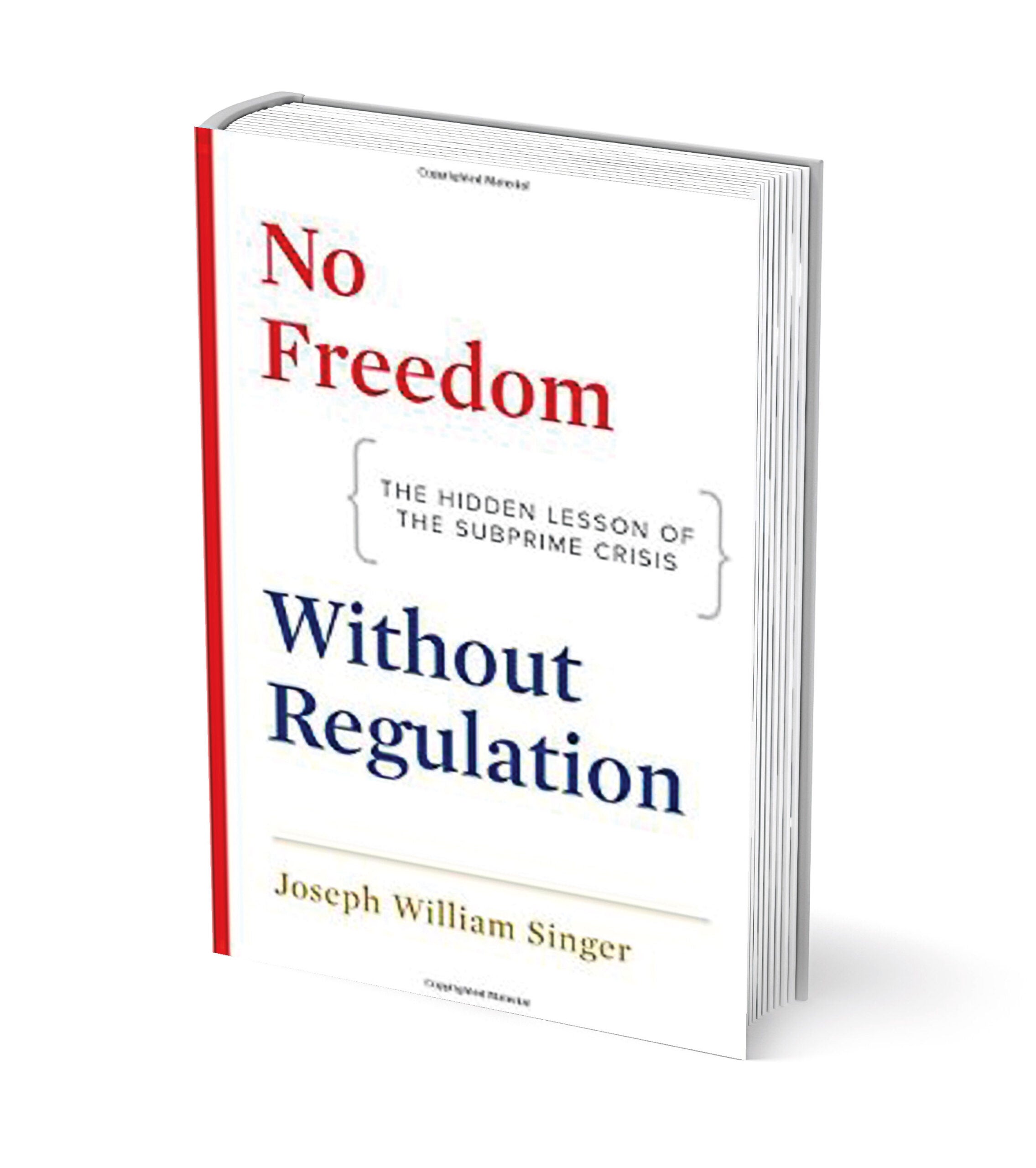In a Property Law class at HLS, the discussion turned to a regulation by a condo association that prohibited residents from flying a flag. One resident refused to comply, and the condo association eventually relented. Congress later passed a law forbidding condominium covenants that prevent residents from flying the U.S. flag.
Two libertarian students in the class began to argue. One said the federal statute interfered with the property rights of the neighbors and the condo association. The other countered that a fundamental right of an owner to fly the flag should not be interfered with. For Professor Joseph Singer ’81, who was teaching the class, the point wasn’t who was right. The point was that two people who shared the same political philosophy of limited government both wanted regulation that would preserve their concept of freedom. The choice, as he writes in his new book, “No Freedom Without Regulation: The Hidden Lesson of the Subprime Crisis,” was “among regulations, not a decision whether or not to regulate.”

Singer argues in his book that regulations make markets and property possible. Regulations are needed to protect us from harm and fraudulent actions by others, to ensure that people can acquire property, and to allow all of us to exercise equal freedoms, he writes. The subprime crisis was a painful and dramatic example that demonstrated the need for consumer protection regulation, including laws that promote disclosure and prevent banks from selling mortgages to people who can’t afford them.
“I don’t think those people were doing anything wrong,” Singer said in an interview. “They wanted to buy a home, and they were told by experts that they could afford the home. And I have no issue with people who trusted the banks when they said, This is a mortgage that’s appropriate for you.”
The book continues his work over the past 30 years focusing on a “progressive version of property law.” He points to the Civil Rights Act of 1964 as a signal event that changed the country and eventually led to his journey to reframe the concept of property. At the time, he explains, people contended that a restaurant owner had a right to exclude someone based on race.
When Singer started teaching property in the mid-1980s, he found nothing in the casebooks on public accommodation statutes. They were considered to be part of anti-discrimination law, not property law: “And I thought, They’re not teaching property law correctly,” he said.
Public accommodation law gives people the right of access to the marketplace, he said—the right to acquire property, not just sell it. People may exclude others from their church or home, but the marketplace is open to everyone. This past summer, Singer applied that principle to an article he wrote asserting that there should not be religious exemptions to public accommodation statutes, such as for florists who refuse to sell flowers for display during a same-sex marriage ceremony.
His book is filled with similar examples of how one person’s property rights affect the property rights of others.
“It is surprisingly easy to forget that property rights are not merely individual entitlements but a system that requires the rights of each to be compatible with the rights of others.”
“It is surprisingly easy to forget,” he writes, “that property rights are not merely individual entitlements but a system that requires the rights of each to be compatible with the rights of others.” Zoning laws, for example, may limit what we can do with our own land because it may affect neighbors’ enjoyment of their property. Landlords can’t fail to provide hot water or comply with a building code. And Singer notes that subprime mortgages were property rights that didn’t just affect home buyers and banks. They nearly ruined the world economy.
Some of the points he raises about the necessity of regulation seem obvious, Singer said. After all, Republican candidates for president are not campaigning to repeal a regulation like the Clean Water Act or the many others that have become ingrained in the American way of life. But he was compelled to respond to the increasing vitriol against regulation, which he traces to the modern president most associated with conservative values.
“Reagan made it in some sense a majority view that government is the problem. Before that, there was debate about what government should do,” Singer said. “Nobody really wants to abolish government. But the rhetoric is that government is evil and corrosive, and regulation takes away our freedom. I think our rhetoric is not in tune with our values.”
He argues that in fact regulation promotes conservative values. For example, consumer protection laws promote freedom of contract by ensuring that buyers get what they want. Likewise, a great deal of law is needed to support a private property system. Regulation protects the individual, which he notes is a core conservative norm. At the same time, free markets and private property reflect liberal values of autonomy and equality, he writes, with legal structures that promote equal opportunity.
The benefits of regulation are all around us, yet many of us don’t see them, Singer said. But he does. He served on the building committee when Langdell Hall was being renovated in 1996. Because of the Americans with Disabilities Act, enhanced disability access was required. It’s true, he said, that without the regulation, the project would have been easier to complete. But then it would have been much harder on people with disabilities (which, as he noted, will be many of us at some point in our lives). For them, the elevators and lifts at the entrance provide access to one of the world’s great law libraries. For Singer, they provide a daily reminder of the freedom that regulations bring.
